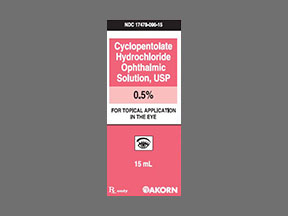
Cyclopentolate Coupons & Savings Card – Discount Prices from $21.34
Generic for: Cyclogyl
My prescription
Edit
15ML of 0.5%, Cyclopentolate (1 Bottle)
Select pharmacy

CVS
$34.80
COUPON PRICE
Albertsons
$21.34
COUPON PRICE
Walgreens
$32.40
COUPON PRICE
Walmart
$56.53
COUPON PRICECyclopentolate savings card
Show this card to your pharmacist
Albertsons
$21.34
BIN
ID
PCN
GRP
019876
LHC2FB06A7
CHIPPO
LHX
Powered by
More prescriptions for pupil dilation
More prescriptions for pupil dilation
Price history for Cyclogyl (brand) & Cyclopentolate (generic)
1 Bottle, 15ML of 0.5%
Average retail price for Cyclogyl
Average retail price for Cyclopentolate
Average SaveHealth price for Cyclopentolate
Our price history data is based on aggregated prescription data collected from participating pharmacies in America. Our prescription data updates daily to reflect the latest price changes. If you notice a missing data point, it means there wasn't sufficient data available to generate a monetary value for that date.
We analyzed Cyclopentolate prices for (15ML of 0.5%, 1 Bottle) over the last 12 months. The average retail price was $160.58, while the average price using the SaveHealth discount card was $56.75. That's a savings of approximately 64.66% when using our Cyclopentolate coupon.
Compared to the generic version, Cyclogyl had an average price of $131.56 over the same time period. With the SaveHealth savings card, Cyclopentolate is 56.86% cheaper on average than Cyclogyl.
*Retail prices are based on pharmacy claims data, and may not be accurate when we don't have enough claims.
Cyclopentolate dosage forms
Dosage Quantity Price from Per unit 1GM 1 Bottle $71.39 $71.39 1GM 2 Bottles $161.76 $80.88 1GM 3 Bottles $252.14 $84.05 15ML of 0.5% 1 Bottle $21.34 $21.34 15ML 1 Bottle $35.47 $35.47 15ML 2 Bottles $44.65 $22.32 15ML 3 Bottles $53.82 $17.94 15ML of 2% 1 Bottle $33.85 $33.85 15ML of 2% 2 Bottles $60.20 $30.10 15ML of 2% 3 Bottles $86.56 $28.85
| Dosage | Quantity | Price from | Per unit |
|---|---|---|---|
| 1GM | 1 Bottle | $71.39 | $71.39 |
| 1GM | 2 Bottles | $161.76 | $80.88 |
| 1GM | 3 Bottles | $252.14 | $84.05 |
| 15ML of 0.5% | 1 Bottle | $21.34 | $21.34 |
| 15ML | 1 Bottle | $35.47 | $35.47 |
| 15ML | 2 Bottles | $44.65 | $22.32 |
| 15ML | 3 Bottles | $53.82 | $17.94 |
| 15ML of 2% | 1 Bottle | $33.85 | $33.85 |
| 15ML of 2% | 2 Bottles | $60.20 | $30.10 |
| 15ML of 2% | 3 Bottles | $86.56 | $28.85 |
| 15ML of 0.5% | 2 Bottles | $35.18 | $17.59 |
| 15ML of 0.5% | 3 Bottles | $49.03 | $16.34 |
